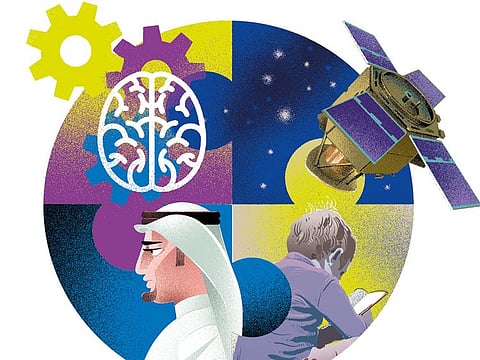Reskilling workforces important for powering future economies
Attention should be paid towards publishing Arabic content to cater to regional talent

In anticipation of evolving global employment trends, policymakers must set out a reimagined road map that hinges on reskilling workforces in the Middle East and North Africa region. As we speak, rapid and multiple transformations are sweeping across various industries, with experts estimating that between 41 and 52 per cent of all work activities in Arab countries will be automated in the near future.
However, a World Economic Forum report states that high-skilled employees account for only 21 per cent of the total MENA labour market, signalling a need for skilled talents who are ready to navigate future occupations and contribute to the region’s economic prosperity.
Unlocking the region’s talent potential calls for a deliberate, well-calculated, large-scale reskilling strategy to capitalise on attractive economic opportunities in the new world of work. This reimagined strategy should consist of a number of tenet policy levers.
To achieve this ambitious vision, governments need to spearhead partnerships with several impactful players — including educators, trainers, and enterprises — in order to fashion a resilient and adaptable workforce.
First and foremost, there is an urgent need to forge new pathways within education systems to reflect high-productive specialisations. Students should be offered tailored guidance services that nudge them towards pursuing these targeted specialisations.
At the same time, special attention must be paid towards honing the skills of students in a range of competencies that are sought after by employers, such as innovation and creativity, digital literacy, analytical thinking, emotional intelligence, lifelong learning, complex problem-solving, and collaboration.
A recently published report by the World Economic Forum projects that by equipping primary and secondary school students with enhanced collaborative problem-solving capacity skills alone, the Middle East economy would see an increase of $266 billion in value.
Data from the job market can shed light on the shifting landscape of labour qualifications and skills, thereby informing reskilling strategies for both the public and private sectors. A great example of this comes from the US’s Bureau of Labor Statistics, which publishes employment projections that span 10 years on national employment by occupation and sector.
Fine-tuning education and training programmes
Such useful data illuminates policymakers with requisites needed to fine-tune education and training programmes according to the evolving employment landscape. On the other hand, the government of Singapore develops its Industry Transformation Maps in partnership with selected employers working in strategic industries.
These maps summarise the industry’s road map with regards to productivity improvement, skills development, innovation, and internationalisation — ultimately spearheading industry transformation and creating jobs.
A special focus on vocational training programs will be much-needed in the coming future as they have demonstrated their effectiveness in equipping graduates with theoretical learning in academic settings, in addition to enrolling them in holistic, practical, and world-class training programs.
To illustrate, private enterprises can partner with government agencies to define required specialisations and skill sets, design educational curricula and training content, and develop on-the-job apprenticeship and training programmes for students.
In many countries, such apprenticeship programs are labour market-driven by private enterprises based on the unique requirements of diverse sectors, whilst governments impose quality standards and ensure experiences are recognised. Apprenticeships are also conducive learning opportunities for students and youths to immerse themselves in real-life work placements so they learn about a profession and hone relevant skills. In the same vein, enterprises can reskill and upskill their employees throughout their careers via rigorous training opportunities in-house.
In a comparative review of apprenticeship programmes across the world, many countries have been lauded for their successful implementation as they have demonstrated the value of market labour-driven training that is very relevant and current to employers’ needs. Germany offers a great case study, with around 50 per cent of young people enrolling in apprenticeship programmes covering 326 professions in various industries.
A hybrid cooperation
The model is based on a hybrid cooperation between publicly funded vocational schools on the one hand, and training at small and medium enterprises on the other. In each week, students attend classes at a vocational school, combined with days training on-site with an employer.
The programme lasts between two to three and a half years, after which students graduate with a certificate. Funding is shared between public and private players, wherein companies pay for the in-house training of apprentices, whilst the Federal States fund vocational schools and local authorities fund related equipment and infrastructures,
The government of Singapore employs another approach with its SkillsFuture policy, focusing on skill attainment and mastery designed to facilitate new career transitions.
One of its signature offerings is an extensive course list that is developed and provided by partner educational providers and covers important subjects within strategic sectors, such as trading skills for financial markets, cloud computing, effective budgeting techniques, cybersecurity fundamentals, barista skills, floristry, 3D animation, early childhood care and education, and real estate sales.
Another interesting initiative is the Capability Transfer Programme, wherein enterprises are encouraged to facilitate the transfer of capabilities from foreign specialists to Singaporean locals, especially in sought-after specialisations.
In tandem, governments should also develop comprehensive lifelong learning platforms that provide useful skill-centred content for employees to access as a launch pad for upskilling and reskilling. In particular, special attention should be paid towards publishing content in the Arabic language in order to cater to a wide pool of regional talents.
Considering the evolving demands of global employment, agile governments should prioritise reskilling their talent bases to advance its economic agenda and enhance societal welfare.
Sara Al-Mulla is an Emirati civil servant with an interest in human development policy and literature



